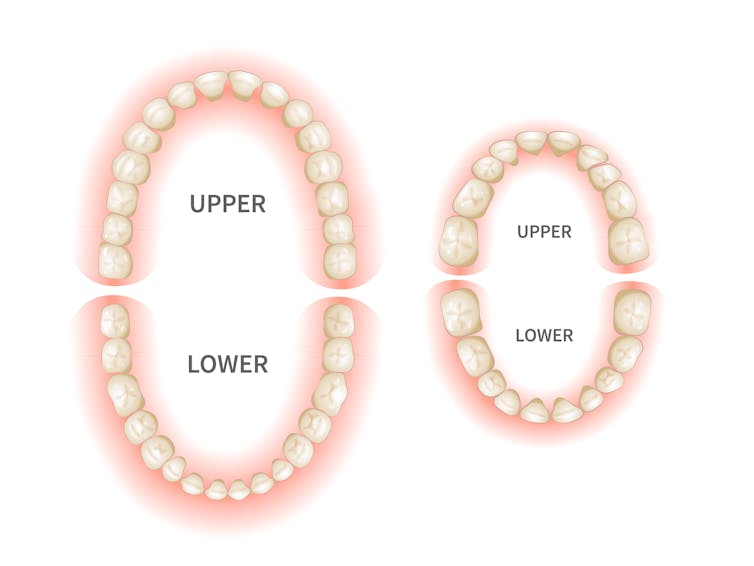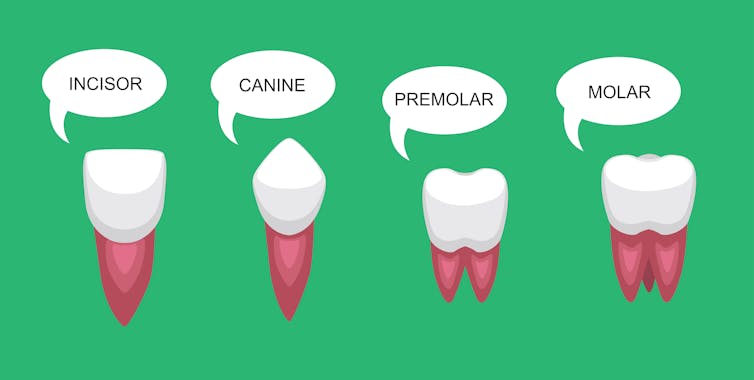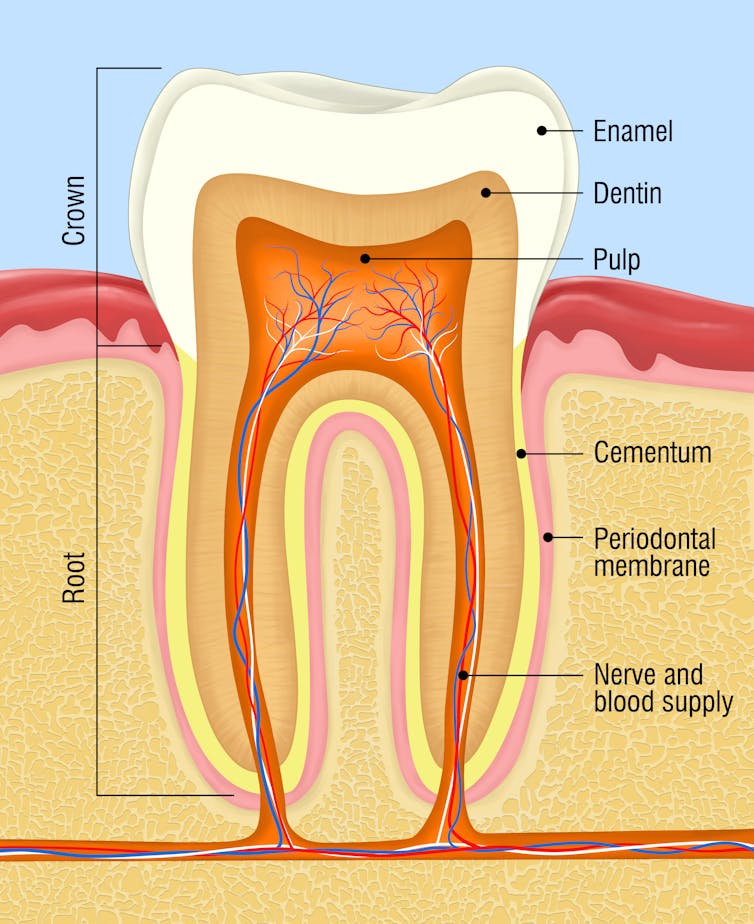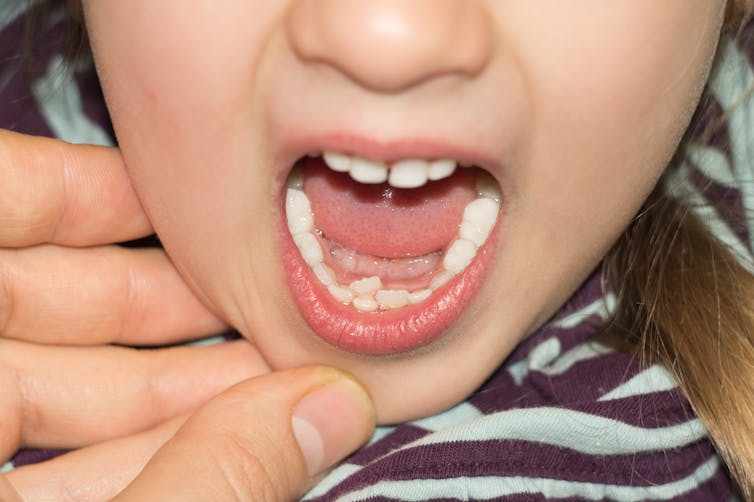why do we lose our baby teeth?
- Written by Mihiri Silva, Paediatric dentist and PhD candidate, Murdoch Children's Research Institute
Curious Kids is a series for children. If you have a question you’d like an expert to answer, send it to curiouskids@theconversation.edu.au You might also like the podcast Imagine This, a co-production between ABC KIDS listen and The Conversation, based on Curious Kids.
Why do we lose our baby teeth? - Jack, age 8.
Losing your first baby tooth is an important part of growing up.
We need teeth to bite, chomp and chew so that we can enjoy a healthy diet with lots of different types of food. Teeth also help us speak and pronounce tricky words. They help to grow our jaws and face and of course, teeth help us smile.
Because of how much we need them, teeth start to grow even before we are born. We can’t see them at the start because they are growing inside our jaws, under our gums. But by the time we are around six months old, we can start to see the first few teeth coming through.
Different teeth have different uses
Most people will eventually get 20 baby teeth. They are our first set of teeth. They will be replaced by adult teeth as we grow up. The last baby tooth usually falls out at about 12 years of age.
 Here you can see adult teeth on the left and baby teeth on the right.
Lars Poyansky/shutterstock
Here you can see adult teeth on the left and baby teeth on the right.
Lars Poyansky/shutterstock
The teeth at the front of the mouth are called incisors, and they have sharp edges for biting (like when we bite into an apple). The really pointy teeth are called canines and we need them to tear off food.
At the back, we have molar teeth. They are big teeth with lots of bumps and grooves to help us chew. Adults also have premolar teeth (but kids do not).
 The different types of teeth. Only adults have premolars.
Maquiladora/shutterstock
The different types of teeth. Only adults have premolars.
Maquiladora/shutterstock
We often don’t notice, but at the same time that our first baby teeth start to fall out, we also get new teeth at the back of our mouth. These are our first adult molar teeth.
By around our sixth birthday, we might start to see and feel some changes in our mouths. Our baby teeth are becoming worn down from all the biting and chewing they have done. We have also grown bigger overall and our jaws and mouths have grown too.
So it’s time for some bigger teeth!
Read more: Curious Kids: How do we get allergic to food?
Teeth have roots too
Teeth stay in the mouth because, like trees, they have roots that hold them in our jaws.
Tooth roots are usually, long and smooth. Front teeth usually have only one root but back teeth can have as many as three roots. When the time is right, our bodies have special cells that slowly eat away the roots of the teeth. As the roots get shorter, the teeth start to become loose. Finally, most of the root disappears and the tooth falls out!
 The parts of a tooth.
Shutterstock
The parts of a tooth.
Shutterstock
Not long after, a new adult tooth will start to peek through the gap left by the baby tooth.
Adult teeth can look a bit funny at the start – they are usually a bit yellower, can have bumps and grooves and are of course much bigger. They also have much longer roots. Adult teeth are made this way so that they are strong enough to last our entire lives. You’ll be chewing food for many, many decades to come. That’s a lot of food to chew through!
The right teeth for the right job
People get two sets of teeth because this is what works best for the way we eat and grow.
Animals are just the same – they have teeth that match the way they eat and grow. Rats like to use their front teeth to nibble and gnaw at food and so have front teeth that keep growing. Alligators can make new teeth whenever they need and sharks have rows of teeth that they replace all the time. They get a lot more sets of teeth than us.
But people only have two sets of teeth so we have to do our best to look after them by brushing twice a day with toothpaste and avoiding sweet drinks and snacks.
 Occasionally, an adult tooth can push through before the baby tooth falls out. Although this often gets better on its own, it may sometimes need treatment - so it’s important to have regular check ups.
Shutterstock
Occasionally, an adult tooth can push through before the baby tooth falls out. Although this often gets better on its own, it may sometimes need treatment - so it’s important to have regular check ups.
Shutterstock
Read more: Curious Kids: How do snakes make an 'sssssss' sound with their tongue poking out?
Hello, curious kids! Have you got a question you’d like an expert to answer? Ask an adult to send your question to curiouskids@theconversation.edu.au
 CC BY-ND
Please tell us your name, age and which city you live in. We won’t be able to answer every question but we will do our best.
CC BY-ND
Please tell us your name, age and which city you live in. We won’t be able to answer every question but we will do our best.
Authors: Mihiri Silva, Paediatric dentist and PhD candidate, Murdoch Children's Research Institute
Read more http://theconversation.com/curious-kids-why-do-we-lose-our-baby-teeth-111911




